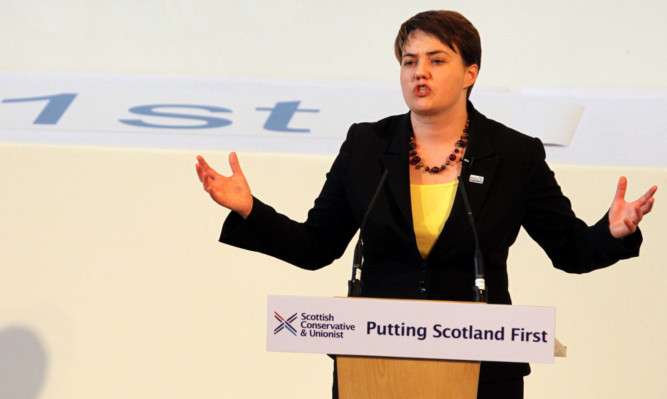
Ruth Davidson is an appealing leader, but the Conservatives remain seriously unpopular in Scotland.
Last week on the STV documentary, Road to Referendum, Douglas Hurd recalled Scottish Conservative Party conferences.
“I always enjoyed going to them,” he said. “But I always felt they were 30 or 40 years out of date.”
Gatherings of the Scottish Tory faithful always appear sepia toned. Every year the venue gets smaller, the pledges of loyalty to the leader a little more forced, and the proceedings more contrived. Tellingly, you can joke about the state of the party without serious fear of contradiction from MSPs and party officials. It’s called putting a brave face on things.
You can also judge the health of a political party by the number (and type) of outside agencies who pay for stalls in the conference venue. In Stirling this weekend there were strikingly few. None were particularly busy. The Main Hall, too, was thinly attended. Just a third of the seats were filled for the UK party chairman, Grant Shapps, while even the Prime Minister didn’t exactly pack the aisles. It didn’t help that his speech started at 10am (meaning conference peaked far too early) and wasn’t trailed, for reasons both good (security) and bad (poor planning).
He said little new.
Indeed, the PM often appears to go through the motions at Scottish Tory gatherings jetting in, delivering a perfunctory speech and departing as quickly as decently possible. He clearly cares about Scotland, just not very much about the Scottish Conservative Party.
But then investing valuable political capital in the Tartan Tories must strike Cameron’s advisers as subject to the law of diminishing returns, a triumph of hope over experience. The Prime Minister has enough on his plate in London. He must rather hope that his Scottish party’s woes would just go away.
The elephant in the room was greater powers for the Scottish Parliament. Kept off the main agenda for fear of upsetting the troops with dangerous talk about more devolution, instead it was pushed to the conference fringe, two lunchtime events chewing over what it might mean for Scotland and the Tories. At least Ruth Davidson’s speech tackled it, and in a few lucid passages she explained to her party why she’d gone down the more devo route.
“If we are to meet the challenges of today,” she told delegates, “we can’t endlessly refight the battles that have gone before. Scotland has moved on, and we have to move on, too.”
It was all met with stony silence. Instead, delegates clapped at all the usual things, pops at the “separatists”, patriotic stuff about our boys on the front line, cutting taxes and so on. The big policy announcement education vouchers had a distinct whiff of the 1980s about it, while a pledge to fund a week’s holiday for carers wasn’t exactly Conservative.
Davidson also acknowledged declining support for the Scottish Conservative Party. Somewhere along the road, she admitted, the party lost touch with too many natural Tory supporters, and they “lost trust in us”. But the party, she assured delegates, was changing.
The tragedy is that so much of the Ruth Davidson package ought to appeal. Articulate, amusing and a bit different, she ticks all the leadership boxes, while strategically, having washed away her line in the sand, the party’s in a better place than it’s been in four decades. Yet it might be too little, too late.
It’s striking how seriously unpopular Conservatives remain in parts of Scotland. Delegates (and even journalists) departing Stirling’s Albert Halls were told they ought to be ashamed of themselves. The bedroom tax was among the reasons, but more generally it was simply for being members of, or associated with, a party regarded as toxic.
This wouldn’t necessarily matter if the party had a decent level of support, but it doesn’t. It would not really matter if it had a decent activist base, but it doesn’t. The atmosphere in Stirling was one of (often badly) managed decline, a bit like Britain in the ’70s.
St Andrew’s First Aid volunteers sat at the back of the hall throughout the proceedings. As far as I know they didn’t have to treat any delegates, but a demonstrably ailing party could have done with a little CPR.

Enjoy the convenience of having The Sunday Post delivered as a digital ePaper straight to your smartphone, tablet or computer.
Subscribe for only £5.49 a month and enjoy all the benefits of the printed paper as a digital replica.
Subscribe